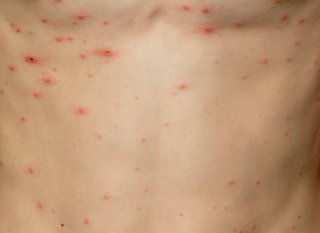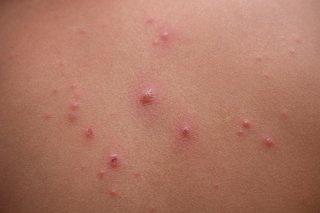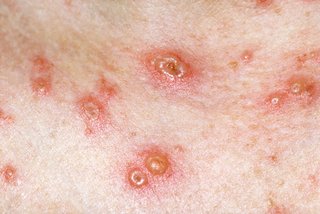Chickenpox is a common infection caused by a virus called varicella zoster.
It mostly affects children under 10, but you can get it at any age.
There’s no cure for chickenpox. It gets better without treatment.
Try to keep a safe distance from other people if you or your child have chickenpox. Avoid contact with pregnant women and babies.
Symptoms of chickenpox
The main symptom of chickenpox is an itchy, spotty rash. It can start anywhere on your body, but spots are often first seen on your head or neck.
Chickenpox happens in 3 stages.
Stage 1: Small spots appear
The spots can:
- appear anywhere on the body - you can also get them inside your mouth
- get very itchy, usually after about 12 to 14 hours
- be red, pink, darker or the same colour as surrounding skin, depending on your skin tone
- be harder to see on brown and black skin

Stage 2: Spots become blisters
The spots fill with fluid and become blisters.
The blisters may:
- be very itchy - they are not usually painful
- burst
- spread or stay in a small area

Stage 3: Blisters become scabs
Some spots form scabs, others leak fluid. This happens after 1 to 2 days.

After 1 to 2 weeks, the scabs fall off.
New spots can keep appearing in waves for 3 to 5 days after the rash begins. There may be groups of spots at different stages of blistering or drying out.
Chickenpox can be very itchy. This can make children feel miserable, even if they do not have many spots.
Chickenpox is usually more severe in adults. Adults have a higher risk of developing complications.
Other symptoms of chickenpox
You may get other symptoms before or after the spots appear.
These include:
- a high temperature above 38 degrees Celsius
- aches and pains
- feeling unwell
- loss of appetite
How to treat chickenpox
There is no cure for chickenpox. But there are things you can do to help manage symptoms.
Ease pain and discomfort
To help control a fever and ease pain and discomfort, you or your child can take paracetamol.
Don't
-
do not use ibuprofen unless your GP tells you to - it can increase the risk of serious skin infections
-
do not use aspirin or products containing aspirin - never give aspirin to children under age 16
Stop the itching
Chickenpox can be very itchy. Scratching can cause scarring. There are things you can do to help ease the itch.
Do
-
keep your child's finger nails clean and short
-
put socks on your child's hands at night to stop them scratching
-
talk to a pharmacist for advice on using cooling creams, such as calamine lotion, or an antihistamine medicine
-
bathe your child in lukewarm water and pat the skin dry
Keep hydrated
Drink plenty of water to avoid dehydration.
Ice pops are a good way of giving children fluids. They can also be soothing if your child has chickenpox spots in their mouth.
Wear cool clothes
Dress your child in loose-fitting clothes. Cotton fabrics are best and will help stop their skin from becoming sore and irritated.
When to get medical help
You or your child do not usually need any medical tests to diagnose chickenpox.
But some children and adults are at risk of serious problems if they get chickenpox.
People more at risk include:
- newborn babies
- pregnant women
- people with a weak immune system
When you might have a weak immune system
Many things can cause a weak immune system (immunosuppressed).
These include:
- some cancer treatments - such as chemotherapy
- some treatments for autoimmune diseases, which include rheumatoid arthritis and multiple sclerosis
- HIV (human immunodeficiency virus)
- an organ transplant or a bone-marrow transplant
- chronic kidney disease
If you are worried about getting the virus, your GP can arrange a blood test.
This will check if you have chickenpox or if you are immune to it (protected from it). You are usually immune if you had chickenpox in the past. You can get chickenpox again, but this is not common.
Urgent advice: Ask for an urgent GP appointment if:
- you or your child has a weak immune system and has been near someone with chickenpox
- the skin around the chickenpox blisters is hot and sore
- your child has chickenpox and is dehydrated
- you think your baby has chickenpox and they are under 1 month old
- the symptoms get worse, such as problems breathing and a headache that does not go away
Tell the GP surgery your child has chickenpox before you go there. They may need to take precautions to prevent the infection spreading.
Emergency action required: Call 112 or 999 or go to an emergency department (ED) if
your child has chickenpox and they:
- have a fit or seizure
- have trouble walking or are very weak
- are drowsy or hard to wake
Tell ED or ambulance staff in advance that your child has chickenpox. They may need to take precautions to prevent the infection spreading.
Chickenpox in pregnancy
If you had chickenpox in the past, you are immune. You do not need to do anything.
Urgent advice: Contact your GP or maternity hospital immediately if
you are not sure if you had chickenpox before and you:
- have been near someone who has the virus
- think you have chickenpox
Your treatment will depend on the stage of your pregnancy and your symptoms.
Most people have chickenpox in childhood. It's rare to get chickenpox while pregnant.
Most pregnant women who get chickenpox recover, with no harmful effects to the baby. But it can sometimes cause health problems for mothers and babies.
About 1 in 10 women who get chickenpox in pregnancy develops pneumonia (serious chest infection).
There's a small risk of your baby being born with an illness. This risk increases if you get chickenpox when you are over 36 weeks pregnant.
Urgent advice: Contact your maternity hospital immediately if
you have chickenpox and you have:
- bleeding from your vagina
- any breathing problems or a bad cough
- a headache, stiff neck, difficulty looking at bright lights or drowsiness
- vomiting or feeling sick
- a rash that is bleeding
To stop your symptoms from getting worse, you may need:
- antiviral medicine through a drip
- immunoglobulin treatment - a blood-based treatment with antibodies to help fight the virus
Important
Tell hospital staff that you have chickenpox before you go there. This is to make sure chickenpox does not spread to other pregnant women or children.
How chickenpox spreads
You can catch chickenpox by being in the same room as someone who has the virus.
It also spreads by touching things that has fluid from the blisters on it.
How long chickenpox is infectious for
After you get the virus, it usually takes 1 to 3 weeks for spots to appear.
Chickenpox is infectious:
- from 2 days before the spots appear
- until the spots crust over - about 5 to 7 days after they first appear
Spots are no longer infectious when they are crusted over and dry.
Stop chickenpox spreading
Keep your child at home if they are unwell. If they have chickenpox, they are infectious from 2 days before spots appear.
While your child is unwell, remember to:
- clean your and your child's hands often
- cover coughs or sneezes with a tissue
- put used tissues into a bin and wash your hands
There are also things you can do to help stop the spread of the virus after spots appear.
Do
-
keep your child off school, preschool or childcare until their spots are crusted over
-
wipe down or sterilise any objects you or your child have touched, such as toys or household items
-
wash infected bedding or clothing
-
keep away from public areas and avoid contact with other people, where possible
Chickenpox (varicella) vaccine
You can get a vaccine to protect you or your child against chickenpox. The vaccine is called the chickenpox (varicella) vaccine.
For anyone born:
- before 1 October 2024 you can pay to get the vaccine through your GP
- after 1 October 2024 the vaccine is free through the HSE childhood vaccine schedule
Travelling with chickenpox
Many airlines will not allow you to fly with chickenpox. Wait until spots crust over, if possible. Or check with your airline before you travel.
Shingles and chickenpox
Shingles is also caused by the varicella zoster virus. You can only get shingles if you had chickenpox.
When you have chickenpox, you usually develop antibodies to the infection and become immune to getting it again.
But the virus stays inactive in your body. The virus can be triggered again if your immune system is weakened. This causes shingles.
